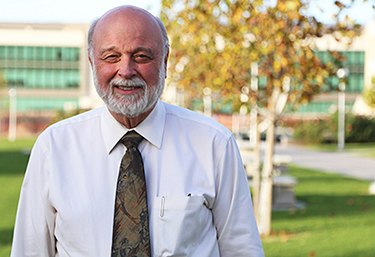 I have just returned from spending 10 days with a group of students and professionals in northern Nigeria. I participate in this sort of opportunity for three primary reasons — to connect with our students and others, to support and strengthen our health care institutions and local professionals in different countries, and to keep myself anchored in the realities of the “majority world,” where two thirds of the world’s population live. We were blessed to have 30 students from four Adventist universities involved in this trip — Loma Linda; Middle East University in Lebanon; Universidad de Montemorelos in Mexico; and Babcock University in Nigeria.
I have just returned from spending 10 days with a group of students and professionals in northern Nigeria. I participate in this sort of opportunity for three primary reasons — to connect with our students and others, to support and strengthen our health care institutions and local professionals in different countries, and to keep myself anchored in the realities of the “majority world,” where two thirds of the world’s population live. We were blessed to have 30 students from four Adventist universities involved in this trip — Loma Linda; Middle East University in Lebanon; Universidad de Montemorelos in Mexico; and Babcock University in Nigeria.
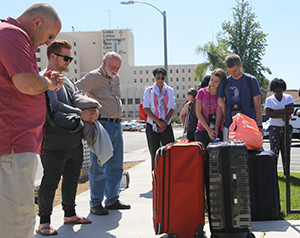
We anchored at Jengre Hospital, a storied but struggling small Adventist hospital about 60 km out of Jos, and saw thousands of patients at Jengre and two sites in Jos. As planned, we had a diverse team and engaged in a variety of activities, including primary care clinics, many different surgical procedures, eye care, dental procedures, rehabilitation evaluations, borehole water sampling, veterinary clinics for the nomadic Fulani and their herds of cattle and goats, Bible schools and educational activities for the children. Our housing options were basic, with cold bucket showers, intermittent electricity, and occasional GI upsets, offset by great Nigerian cooks and mango season. Despite the challenges of living here, everyone we met walking back and forth to our assignments greeted us with a ready smile and “Good mornin’, Suh.” One of the great additions on this trip was over 200 volunteer Nigerians from many professions who provided cultural understanding and professional help.
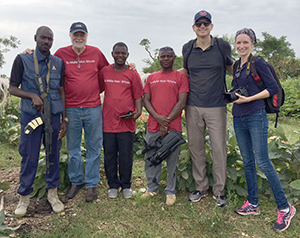
Rainy season had begun, and the fields were either being prepared or already had maize, yams, soy beans, tomatoes, or rice coming up. Their agricultural culture follows tried and true methods that were old a thousand years ago – deep troughs between the planting ridges, designed to carry away the periodic downpours. Maize is the staple, planted two kernels per hole, about 8-10 inches apart. One of my favorite fast foods is still fresh roasted corn-on-the-cob from roadside vendors, sitting around their little fires with 5-6 ears ready at any time. All this raises the old developmental issue, wouldn’t they do better by combining all these farms, buying a tractor, and mechanizing the whole operation? And the answer is the same — who would actually benefit by taking away a family’s heritage and work ethic even if you replace it by money? History has shown that if happiness is the goal, it is usually best to leave the system intact and retain the social fabric.
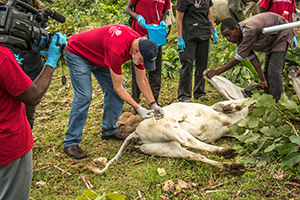
I divided my time between the endless clinics and tending to administrative duties. I even took a day at being a vet, giving antibiotic injections to over 60 Fulani cattle. But it was seeing human patients that rested most heavily on my consciousness. First, let me say we have oversold the value of “medicine,” in any form and for every purpose. It is the magic from the West, and each patient feels they have simply not been cared for if they don’t receive at least one prescription. But in between the various aches and pains, there were real cases with tragic pathology:
- The young man with a septic leg following a dog bite eight months earlier who was unable to afford care;
- The malnutrition and protruding abdomens caused by Ascaris (look it up) in so many children;
- The young woman with a tense ballooning belly from ascites caused by liver failure;
- The many with dangerous hypertension but unable to afford medication;
- The boy with a huge palpable spleen filling half his abdomen from recurrent sickle cell crises;
- The young mother of two with probable lymphoma, treatable in our country, but sent home to die due to lack of resources or connections.
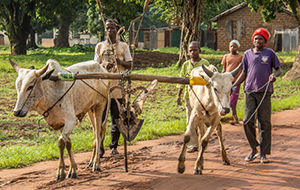
So why are some of us blessed with so much, while so many struggle in endless cycles, generation to generation? Where is that biblical year of jubilee, a time of rebalancing the world’s resources? The amount of medical capital we spend chasing a minor ailment at home could care for entire villages in many countries.
It is stories like these that tore at our feelings as we struggled between compassion and justice. As I have said to our San Bernardino students back home, your genetic code is more important than your zip code. But these people are locked into “zip codes” that forever doom them to hard manual labor with little discretionary choices in life. In these settings, life does not seem fair! Mission trips like ours and so many others are thin Band-Aids on the world’s diseases.
Let’s don’t kid ourselves that we are really solving much with our “do good” journeys to the Majority World and their challenges. Loma Linda continues to organize trips like these primarily because it benefits ourselves, providing “teachable moments” for self-reflection and understanding. It is only when we can leave something behind — institutions or education, as well as intangibles like friendship and hope, that we have any chance of breaking this cycle.
So what to do? I think it is important to clarify that compassion is more than sympathy. Compassion compels to action. It gets involved. At the deepest level it is almost selfish in that it satisfies a longing within each of us. It fulfills the deepest need of the human soul to have meaning, to make a difference. The challenge is to do it well, to move beyond the superficial and do something with lasting impact. Pray that Loma Linda never loses that understanding and commitment.
Sincerely yours,

Richard Hart, MD, DrPH
President
Loma Linda University Health